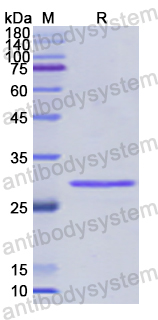Catalog No.
YHD76301
Expression system
E. coli
Species
Homo sapiens (Human)
Protein length
Met1-Ile241
Predicted molecular weight
28.72 kDa
Nature
Recombinant
Endotoxin level
Please contact with the lab for this information.
Purity
>90% as determined by SDS-PAGE.
Accession
P28066
Applications
ELISA, Immunogen, SDS-PAGE, WB, Bioactivity testing in progress
Form
Lyophilized
Storage buffer
Lyophilized from a solution in PBS pH 7.4, 0.02% NLS, 1mM EDTA, 4% Trehalose, 1% Mannitol.
Reconstitution
Reconstitute in sterile water for a stock solution. A copy of datasheet will be provided with the products, please refer to it for details.
Shipping
In general, proteins are provided as lyophilized powder/frozen liquid. They are shipped out with dry ice/blue ice unless customers require otherwise.
Stability and Storage
Use a manual defrost freezer and avoid repeated freeze thaw cycles. Store at 2 to 8°C for frequent use. Store at -20 to -80°C for twelve months from the date of receipt.
Alternative Names
Proteasome zeta chain, Multicatalytic endopeptidase complex zeta chain, Proteasome subunit alpha type-5, Macropain zeta chain, PSMA5
Identification of Key Proteomic Markers for Enhanced Conjugated Linoleic Acid Biosynthesis in Lactating Goats via Linseed Oil Supplementation., PMID:39919035
Role and mechanism of IRF9 in promoting the progression of rheumatoid arthritis by regulating macrophage polarization via PSMA5., PMID:39170377
Tissue-specific gene expression of genome-wide significant loci associated with major depressive disorder subtypes., PMID:38663672
Manual on the proper use of the 211At-labeled PSMA ligand ([211At]PSMA-5) for clinical trials of targeted alpha therapy (1st edition)., PMID:38548987
Knockdown of liver cancer cell-secreted exosomal PSMA5 controls macrophage polarization to restrain cancer progression by blocking JAK2/STAT3 signaling., PMID:38415977
An immune-related exosome signature predicts the prognosis and immunotherapy response in ovarian cancer., PMID:38238671
Single-cell and transcriptomic analyses reveal the influence of diabetes on ovarian cancer., PMID:38166541
Combined analysis of single-cell and bulk RNA sequencing reveals the expression patterns of circadian rhythm disruption in the immune microenvironment of Alzheimer's disease., PMID:37251379
Exploration of anti-stress mechanisms in high temperature exposed juvenile golden cuttlefish (Sepia esculenta) based on transcriptome profiling., PMID:37234426
Lithium Chloride Promotes Endogenous Synthesis of CLA in Bovine Mammary Epithelial Cells., PMID:37099221
PSMA5 contributes to progression of lung adenocarcinoma in association with the JAK/STAT pathway., PMID:35605971
Curcumin prevents proteins expression changes of oxidative phosphorylation, cellular stress response, and lipid metabolism proteins in liver of mice fed a high-fructose diet., PMID:35490921
Bayesian hierarchical lasso Cox model: A 9-gene prognostic signature for overall survival in gastric cancer in an Asian population., PMID:35421138
Proteomics Analysis of Aqueous Humor and Rejected Graft in Pig-to-Non-Human Primate Corneal Xenotransplantation., PMID:35401527
Quantitative Proteomics Reveals Molecular Network Driving Stromal Cell Differentiation: Implications for Corneal Wound Healing., PMID:35269714
Cathepsin D as a potential therapeutic target to enhance anticancer drug-induced apoptosis via RNF183-mediated destabilization of Bcl-xL in cancer cells., PMID:35121737
A Hypoxia-Associated Prognostic Gene Signature Risk Model and Prognosis Predictors in Gliomas., PMID:34868920
Conserved Mitotic Phosphorylation of a Proteasome Subunit Regulates Cell Proliferation., PMID:34831298
Prognostic and Predicted Significance of FENDRR in Colon and Rectum Adenocarcinoma., PMID:34621665
Hepatitis C virus induces oxidation and degradation of apolipoprotein B to enhance lipid accumulation and promote viral production., PMID:34492079
Clinical Significance, Cellular Function, and Potential Molecular Pathways of CCT7 in Endometrial Cancer., PMID:32983981
Proteomic Profiling of Serum Exosomes From Patients With Metastatic Gastric Cancer., PMID:32754443
Biallelic variants in PSMB1 encoding the proteasome subunit β6 cause impairment of proteasome function, microcephaly, intellectual disability, developmental delay and short stature., PMID:32129449
IL-13 Impairs Tight Junctions in Airway Epithelia., PMID:31262043
PSMA5 promotes the tumorigenic process of prostate cancer and is related to bortezomib resistance., PMID:30807553
Altered unfolded protein response and proteasome impairment in pseudoexfoliation pathogenesis., PMID:30738879
Upregulation of Proteolytic Pathways and Altered Protein Biosynthesis Underlie Retinal Pathology in a Mouse Model of Alzheimer's Disease., PMID:30707393
Comparative proteomic analysis of cat eye syndrome critical region protein 1- function in tumor-associated macrophages and immune response regulation of glial tumors., PMID:30323894
NOX4-mediated ROS production induces apoptotic cell death via down-regulation of c-FLIP and Mcl-1 expression in combined treatment with thioridazine and curcumin., PMID:28806703
Thioridazine enhances sensitivity to carboplatin in human head and neck cancer cells through downregulation of c-FLIP and Mcl-1 expression., PMID:28182008
Conservation of the Nrf2-Mediated Gene Regulation of Proteasome Subunits and Glucose Metabolism in Zebrafish., PMID:28116036
Colonic Lamina Propria Inflammatory Cells from Patients with IBD Induce the Nuclear Factor-E2 Related Factor-2 Thereby Leading to Greater Proteasome Activity and Apoptosis Protection in Human Colonocytes., PMID:27661668
Human Telomerase Reverse Transcriptase (hTERT) Positively Regulates 26S Proteasome Activity., PMID:27648923
Insights into the potential of picoplanktonic marine cyanobacteria strains for cancer therapies - Cytotoxic mechanisms against the RKO colon cancer cell line., PMID:27242042
Regulation of global gene expression and cell proliferation by APP., PMID:26936520
Galangin sensitizes TRAIL-induced apoptosis through down-regulation of anti-apoptotic proteins in renal carcinoma Caki cells., PMID:26725939
Regulation of Endoribonuclease Activity of Alpha-Type Proteasome Subunits in Proerythroleukemia K562 Upon Hemin-Induced Differentiation., PMID:26661102
A Microbial Feed Additive Abates Intestinal Inflammation in Atlantic Salmon., PMID:26347738
A high-affinity [(18)F]-labeled phosphoramidate peptidomimetic PSMA-targeted inhibitor for PET imaging of prostate cancer., PMID:26169882
Proteomic Analysis of G2/M Arrest Triggered by Natural Borneol/Curcumin in HepG2 Cells, the Importance of the Reactive Oxygen Species-p53 Pathway., PMID:26051007
[Mass-spectrometric analysis of proteasomal subunits possessing endoribonuclease activity]., PMID:25509164
Apigenin manipulates the ubiquitin-proteasome system to rescue estrogen receptor-β from degradation and induce apoptosis in prostate cancer cells., PMID:25408199
Alteration in endometrial proteins during early- and mid-secretory phases of the cycle in women with unexplained infertility., PMID:25405865
Regulation of p53 and Rb links the alternative NF-κB pathway to EZH2 expression and cell senescence., PMID:25255445
[Detection for therapeutic targets specifically expressed in myeloma side population cells]., PMID:25016803
Immunoaffinity purification of the functional 20S proteasome from human cells via transient overexpression of specific proteasome subunits., PMID:24583181
DNA damage-induced ubiquitylation of proteasome controls its proteolytic activity., PMID:23907514
Bortezomib reduces the tumorigenicity of multiple myeloma via downregulation of upregulated targets in clonogenic side population cells., PMID:23469177
Inhibition of the Nrf2 transcription factor by the alkaloid trigonelline renders pancreatic cancer cells more susceptible to apoptosis through decreased proteasomal gene expression and proteasome activity., PMID:23108405
Polyclonal antibodies against human proteasome subunits PSMA3, PSMA5, and PSMB5., PMID:22894781

